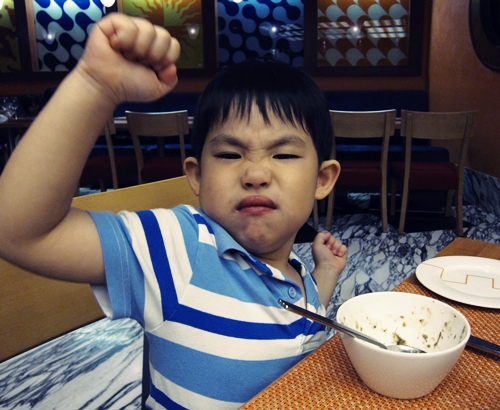"If I don't raise my voice at you, you don't listen!"
"You cannot be looking at me everytime before you swing your club, you know what to do as you have learnt the process!"
"I don't shout at my students, you give me no choice. When I don't raise my voice, you don't listen."
"You have learnt this so many times, I find myself repeating the same things over and over but you are not correcting your mistakes. You just don't seem to care…sigh…"
I heard these remarks from Kyle's golf coach behind the doors of the classroom during his last lesson. However, it was not directed at Kyle but at another boy who was taking the golf classes together with Kyle. Each time the coach made a remark like that, I strained to hear whose name he was calling, since Kyle's classmate's name also starts with K. It was not Kyle that he was speaking to each time he raised his voice, as I will be certain that Kyle would have burst into tears and ran out of class if the teacher was so stern with him.
Yeah, Kyle is a softie and tends to cry very easily if he is reprimanded at home or in school, as his kindergarten teacher have fed back previously that Kyle cries very easily when he is being reprimanded for misbehaving 
When the golf lesson ended, Kyle's coach gave his feedback to his classmate K's grandmother and maid who was sitting outside of the classroom. He said that classmate K lacked initiative, tends to be too dependent on him before he takes a swing, and seemed to be expecting specific instructions each time. When in fact, he has already learnt the techniques and knows the techniques that needs correction. Then the golf coach asked K classmate's grandma, "Is he like that at home? And is the caregiver always doing his things for him?" His grandma nodded her head to his question and replied, "Ah, his mother and father always want to give him the best," The coach was rather dumbfounded when he heard that response, but he added, "It will be good if he is not so sheltered. I am concerned that he is not taking the initiative to make improvements to the point that his classmate Kyle's skills has surpassed his, even though Kyle has joined much later." Then coach turned to me and said, "So far so good for Kyle, he is very confident in his swing, just that he tends to be a bit impatient at times."
I am not quoting this incident as I am brimming with pride that my child is better than his classmate, but rather, I am worried that if I don't make a conscious effort to build good habits in Kyle, he might one day lose his initiative and become an older child who will have little or no initiative in anything that he undertakes, as he will always expect that his mom or helper will help him along.
When a child grows in an environment when he has alot of help, he tends to develop an overdependency and then cease to make a conscious effort to take an initiative to do things for himself, and eventually lose that ability to do alot of things if there is no prompting or direction from others. I am already seeing some bad habits developing;
– Not picking up his dirty clothing and putting it in the laundry basket
– Shouting for the helper's help to search for something, when he hasn't even started looking
– Asking the helper to throw away his used sweet/biscuit wrappers
I have taken all these bad habits very seriously and started berating him by asking him if he is a handicapp, always needing help to do simple things (I tend to be quite harsh, think I really need to manage what I say at times ). Correcting the habit needs alot of patience; so as to guide him along towards the correct behaviour, I had to walk with him to the waste paper basket and watch him exhibit the correct behaviour and then praise him for it.
). Correcting the habit needs alot of patience; so as to guide him along towards the correct behaviour, I had to walk with him to the waste paper basket and watch him exhibit the correct behaviour and then praise him for it.
Some areas that that I have managed to train Kyle;
– Clearing up his toys after every play session
– Clearing his own used plate + cutlery after every meal and putting them in the sink
– Choosing his own clothes and wearing the clothes himself
– Putting on his socks and shoes
– Getting himself ready every morning for school or making sure he is dressed and ready before we go out.
The last point has been rather tough to achieve, as it came with alot of stern reprimands for weeks. It was only recently that it finally dawn on him that he is sick of being scolded while walking to school and starting the day with a bad mood.
Still work in progress :
– Learning to take his own bath, or clean himself after a poop
– Doing his homework (from school) every weekend without having to be reminded
– Taking his own food or snack and pouring his own drink.
– Making his own bed, tough to achieve since he is bunking in my room 80% of the time these days
– Getting him out of bed in the mornings
– Helping out in chores (it is quite hard to achieve especially with domestic help, but for a start, he cleans up his table and the brushes after a messy art session)
It gets alot more challenging to develop positive habits due to a presence of a domestic help at home. To ensure that habits training is followed through, I have to remind my helper not to lend a helping hand each time and then watch carefully that my instructions are being followed through.
I try not to encroach on my child’s developing initiative by trying to control every moment of his day, also allowing him to learn to invent his own games, without depending on me to amuse him. He is also given the freedom to add his personal touch to school work within my boundaries. This is a valid consideration since formal education seems to lean the other direction,
“In their work, too, we are too apt to interfere with children. We all know the delight with which any scope for personal initiative is hailed, the pleasure children take in doing anything which they may do their own way; anything, in fact, which allows room for skill of hand, play of fancy, or development of thought. With our present theories of education it seems that we cannot give much scope for personal initiative. There is so much task-work to be done, so many things that must be, not learned, but learned about, that it is only now and then a child gets the chance to produce himself in his work. But let us use such opportunities as come in our way…and our non-success in education is a good deal due to the fact that we carry children through their school work and do not let them feel their feet” (Charlotte Mason Vol. 3, pp. 37, 38).
I really wonder how working moms/parents are able to develop good habits in their children when quality time is limited to after work hours / weekends. Is this achievable for a full time working parent? Can they instruct domestic help or grandparents to follow through, or all these are just neglected as being something that 'The child will eventually grow out of'?
Call me micro whatever, but I don't want to raise a boy like most asian men that I know, whose moms tend to smoother them while growing up and then become adults who hope to have wives or domestic help to clean after them all the time. So training of the habit of initiative in Kyle needs to start right now.
“The busy mother says she has no leisure to be that somebody [who informs and gives direction], and the child will run wild and get into bad habits; but we must not make a fetish of habit; education is a life as well as a discipline. Health, strength, and agility, bright eyes and alert movements, come of a free life, out-of-doors, if it may be; and as for habits, there is no habit or power so useful to man or woman as that of personal initiative” (Charlotte Mason Vol. 1, p. 192).























